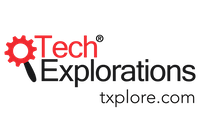[spp-player]

In this episode, Dr. Peter Dalmaris and Marcus Schappi talk with Jesse King.
Jesse is a Waanyi descendant who has a passion for education and the opportunities it provides for everyone involved.
He has close ties to the Mt Isa and Central Queensland regions through his father and mother’s family. Jesse attended school in Townsville and completed his teacher training at Charles Darwin University.
He is keenly interested in the opportunities 21st-century pedagogy offers for learners of all abilities and backgrounds.
Jesse has experience in classroom teaching, school leadership, learning management system implementation (School and Sector), school strategic planning and has successfully gained funding and delivered a variety of programs at the school level.
This is Stemiverse Podcast episode 46.
Stemiverse podcast is brought to you by Tech Explorations, a leading provider of educational resources for Makers, STEM students, and teachers. Go to techexplorations.com to see a complete list of our books and courses covering the Arduino, Raspberry Pi, and electronics.
Show Notes
- [spp-timestamp time=”00:00″] Introduction – Introducing Jesse King
- [spp-timestamp time=”02:09″] Greetings
- [spp-timestamp time=”03:04″] About Townsville, Queensland, Australia
- [spp-timestamp time=”05:47″] Jesse talks about his background
- [spp-timestamp time=”08:25″] Why did Jesse become an Educator?
- [spp-timestamp time=”11:33″] Jesse describes his first teaching assignment
- [spp-timestamp time=”14:33″] Did Jesse have more or fewer resources than a metropolitan teacher?
- [spp-timestamp time=”18:03″] Network Infrastructure in smaller cities of Australia
- [spp-timestamp time=”19:07″] Jesse’s current work at Townsville, Australian Tropical Sciences, and Innovation Precinct – CSIRO – The Indigenous STEM Education Project
- [spp-timestamp time=”19:42″] The Inquiry for Indigenous Science Students
- [spp-timestamp time=”21:06″] Bringing hands-on Indigenous science into the classroom
- [spp-timestamp time=”22:19″] Professional Development for teachers
- [spp-timestamp time=”23:45″] Prior considerations for teachers before embarking on a program like the Inquiry for Indigenous Science Students: Cultural awareness and diversity of thought
- [spp-timestamp time=”26:58″] Codifying the knowledge that has been passed through Aboriginal tradition
- [spp-timestamp time=”30:19″] Focusing on the non-secret non-sacred knowledge
- [spp-timestamp time=”31:30″] What we can learn from the Aboriginal teaching practices
- [spp-timestamp time=”32:06″] Gradual release of responsibility
- [spp-timestamp time=”34:20″] Scientific inquiry that has been going on in Australia for thousands of years
- [spp-timestamp time=”36:52″] Science Pathways for Indigenous Communities
- [spp-timestamp time=”39:14″] The elements and outcomes of the Indigenous STEM Education Project:
- [spp-timestamp time=”41:54″] Indigenous STEM Awards: Rewards and Projects
- [spp-timestamp time=”44:15″] 2017 Indigenous STEM Awards winners and finalists: Dr. Misty Jenkins, Dean Foley, Shailyn Isaac, Kayla Pattel and more
- [spp-timestamp time=”46:11″] The Bachelor of Science (Extended) degree provides a pathway for Indigenous students
- [spp-timestamp time=”48:17″] How does the Bachelor of Science (Extended) program maintain or increase retention of students?
- [spp-timestamp time=”50:22″] What are the lessons that people from other communities can learn from Jesse’s experiences in Australian diversity and the program that he is a part of, at CSIRO?
- [spp-timestamp time=”52:39″] Rapid Fire Questions
- [spp-timestamp time=”52:44″] What resources provided by the government could help with achieving the most significant amount of change in teaching students?
- [spp-timestamp time=”54:07″] Most influential people to the way in which Jesse teaches
- [spp-timestamp time=”55:23″] Advice to educators that teach with material that Jesse and CSIRO are making
- [spp-timestamp time=”56:33″] Algebra or Geometry?
- [spp-timestamp time=”58:07″] Parting thoughts, dos and don’ts
- [spp-timestamp time=”59:03″] Jesse’s preference: Twitter, Facebook or Email?
- [spp-timestamp time=”59:52″] Jesse’s Contact Information: Email, LinkedIn, Website

